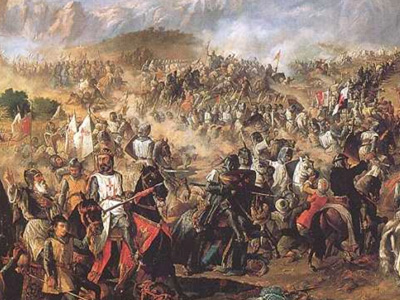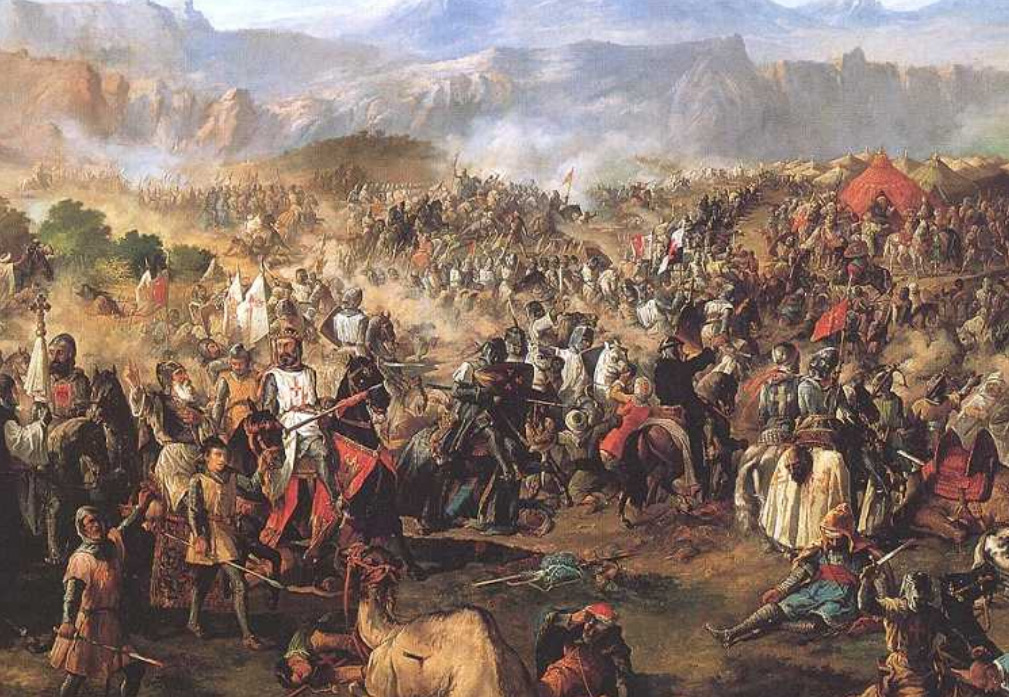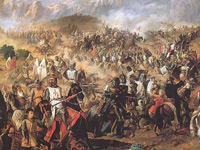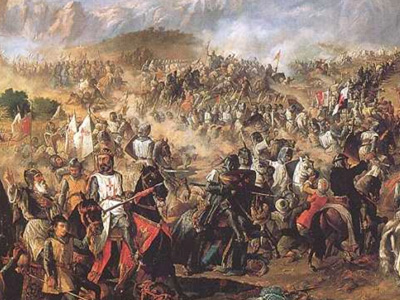Battle of Las Navas de Tolosa (1212)

The Battle of Las Navas de Tolosa, known in Arab history as the Battle of Al-Uqab, took place on 16 July 1212 and was an important turning point in the Reconquista and in the medieval history of Spain. The Christian forces of King Alfonso VIII of Castile were joined by the armies of his rivals, Sancho VII of Navarre, Peter II of Aragon and Afonso II of Portugal, in battle against the Almohad Muslim rulers of the southern half of the Iberian Peninsula. The Caliph al-Nasir (Miramamolín in the Spanish chronicles) led the Almohad army, made up of people from the whole Almohad empire. Most of the men in the Almohad army came from the African side of the empire.

A 19th century portrayal of the battle by Francisco de Paula Van Halen
Background
In 1195, Alfonso VIII of Castile was defeated by the Almohads in the so-called Disaster of Alarcos. After this victory the Almohads took several important cities: Trujillo, Plasencia, Talavera, Cuenca, and Uclés. Then, in 1211, Muhammad al-Nasir crossed the Strait of Gibraltar with a powerful army, invaded Christian territory, and captured Salvatierra Castle, the stronghold of the knights of the Order of Calatrava. The threat to the Hispanic Christian kingdoms was so great that Pope Innocent III called European knights to a crusade.
Previous movements
There were some disagreements among the members of the Christian coalition: French and other European knights did not agree with Alfonso's merciful treatment of Jews and Muslims who were previously defeated in the conquest of Malagón and Calatrava la Vieja. Previously, they had caused problems in Toledo, (where the different armies of the Crusade gathered), with assaults and murders in the Jewish Quarter.
Battle
Alfonso crossed the mountain range that defended the Almohad camp, sneaking through the Despeñaperros Pass, being led by Martin Alhaja, a local shepherd who knew the area. The Christian coalition caught the Moorish army at camp by surprise, and Alhaja was granted the hereditary title Cabeza de Vaca for his assistance to Alfonso VIII.
According to legend, the Caliph had his tent surrounded with a bodyguard of slave-warriors who were chained together as a defense. The Navarrese force led by their king Sancho VII broke through this bodyguard. The Caliph escaped, but the Moors were routed, leaving heavy casualties on the battlefield. The victorious Christians seized several prizes of war: Miramamolín's tent and standard were delivered to Pope Innocent III.
Christian losses were far fewer, only about 2,000 men (though not as few as legend had it). The losses were particularly heavy among the Orders. Those killed included Pedro Gómez de Acevedo (bannerman of the Order of Calatrava), Alvaro Fernández de Valladares (comendator of the Order of Santiago), Pedro Arias (master of the Order of Santiago, died of wounds on 3 August) and Gomes Ramires (Portuguese master of the Knights Templar and simultaneously master of Leon, Castile and Portugal). Ruy Díaz (master of the Order of Calatrava) was so grievously wounded that he had to resign his command.
The Caliph Muhammad al-Nasir himself died in Marrakech shortly after the battle, where he had fled after the defeat.
Aftermath
The crushing defeat of the Almohads significantly hastened their decline both in the Iberian Peninsula and in the Maghreb a decade later. That gave further impulse to the Christian Reconquest and sharply reduced the already declining power of the Moors in Iberia. Shortly after the battle, the Castilians took Baeza and then Úbeda, major fortified cities near the battlefield and gateways to invade Andalusia. According to Letter from Alfonso VIII of Castile to Pope Innocent III, Baeza was evacuated and its people moved to Úbeda, here the king laid siege and put to death 60,000 muslims and enslaved many more. According to the latin chronicle of kings of castile the number given is almost 100,000 Saracens, including children and women, were captured.
Thereafter, Alfonso VIII's grandson Ferdinand III of Castile took Cordova in 1236, Jaén in 1246, and Seville in 1248; then he took Arcos, Medina-Sidonia, Jerez, and Cadiz. In 1252, Ferdinand was preparing his fleet and army for invasion of the Almohad lands in Africa. But he died in Seville on 30 May 1252, during an outbreak of plague in southern Hispania. Only Ferdinand's death prevented the Castilians from taking the war to the Almohad on the Mediterranean coast, James I of Aragon conquered the Balearic Islands (from 1228 over the following four years) and Valencia (the city capitulated on 28 September 1238).
By 1252 the Almohad empire was almost finished, at the mercy of another emerging African power. In 1269 a new association of African tribes, the Marinids, took control of the Maghreb, and most of the former Almohad empire was under their rule. Later, the Marinids tried to recover the former Almohad territories in Iberia, but they were definitively defeated by Alfonso XI of Castile and Afonso IV of Portugal in the Battle of Río Salado, the last major military encounter between large Christian and Muslim armies in Hispania.
HISTORY

RESOURCES
This article uses material from the Wikipedia article "Battle of Las Navas de Tolosa (1212)", which is released under the Creative Commons Attribution-Share-Alike License 3.0.
© Stories Preschool. All Rights Reserved.









